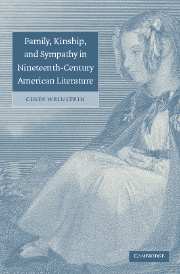Book contents
- Frontmatter
- Contents
- Acknowledgments
- Introduction
- 1 In loco parentis
- 2 “A sort of adopted daughter”: family relations in The Lamplighter
- 3 Thinking through sympathy: Kemble, Hentz, and Stowe
- 4 Behind the scenes of sentimental novels: Ida May and Twelve Years a Slave
- 5 Love American style: The Wide, Wide World
- 6 We are family, or Melville's Pierre
- Afterword
- Notes
- Select bibliography
- Index
- Cambridge Cultural Social Studies
6 - We are family, or Melville's Pierre
Published online by Cambridge University Press: 22 September 2009
- Frontmatter
- Contents
- Acknowledgments
- Introduction
- 1 In loco parentis
- 2 “A sort of adopted daughter”: family relations in The Lamplighter
- 3 Thinking through sympathy: Kemble, Hentz, and Stowe
- 4 Behind the scenes of sentimental novels: Ida May and Twelve Years a Slave
- 5 Love American style: The Wide, Wide World
- 6 We are family, or Melville's Pierre
- Afterword
- Notes
- Select bibliography
- Index
- Cambridge Cultural Social Studies
Summary
Running through many families are secret amours.
(Marriage: Its History, Character, and Results)Despite the fact that today Melville's reputation and readership are considerably greater than Caroline Lee Hentz's or Mary Jane Holmes's, to name just two extremely popular antebellum writers, and despite Pierre's insistent harangues against “the countless tribes of common novels,” Pierre was (and is) desperate to be one of them. On the most practical level, Melville very much wanted to write a popular novel that would bring his family much-needed income. On a more theoretical level, “common novels” begin with absent parents who leave their children alone, a condition Pierre devoutly wishes for. Though the separation between parent(s) and children is painful and often inexplicable (why can't Ellen Montgomery go overseas with her mother and father? what takes Gerty's father so long to find his daughter?), these young girls become women. If we can use Pierre as a piece of counter-factual evidence, they develop and flourish precisely because they have been freed from their biological parents. Gerty and Ellen grow, they learn, they live. Pierre shrivels up, deludes himself into thinking he's learned something about “the all-comprehending round of things” (111), and then dies. Why the difference?
One decisive reason is that the plots of many sentimental novels depend upon their protagonists' ability to create new affections based on the voluntary bonds of contract, which allows the scope of the novel to extend beyond the limitations of consanguinity.
- Type
- Chapter
- Information
- Publisher: Cambridge University PressPrint publication year: 2004

